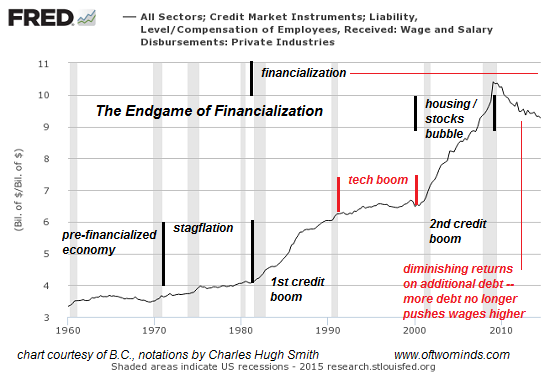When push comes to shove, you only need one chart to predict the future: debt and wages ( credit and compensation). This chart displays debt and wages as a ratio: debt/wages. What it reveals is the endgame of financialization: creating more debt no longer pushes wages higher.

.
I have broken the past five decades into easily recognizable economic periods. During the organic growth of the 1960s that many view as the ideal--what I term the pre-financialized economy, the line is almost flat, as debt and wages expanded in a balanced fashion.
The 1970s, a rocky period of stagflation, higher energy costs and painful adjustments to the economy, is remarkably stable when boiled down to the debt/wage ratio.
Financialization--the securitization of previously stable assets, the expansion of leverage and speculative financial instruments--began in the early 1980s. We see the effect of rapidly expanding debt on the economy: the line leaps higher and only flattens out in the tech-boom 1990s.
Why did the ratio flatten out? This was a period of organic expansion similar to the 1960s: wages expanded as did the number of jobs. Debt and wages once again expanded in a balanced fashion.
After the tech bubble burst, the Federal Reserve lowered interest rates and pushed financialization to the max. The debt/wage ratio line soared on the rocket fuel of debt, leverage and speculation.
But something changed around 2009. Expanding debt and leverage no longer boosted wages. For the first time in 30 years, juicing debt and leverage did not push wages higher--rather, wages declined or stagnated, despite trillions of dollars of Fed stimulus, near-zero interest rates and all the other tricks of financialization.
The returns on additional debt and leverage have diminished to near-zero. This is the endgame of financialization: expanding debt and leverage no longer move the needle on wages and household income. Rather, adding more debt is weighing on wages.
After 30 years of success, the endgame is finally here. We are witnessing a profound secular sea-change: the failure of expanding debt and leverage to lift the real economy of wages and household income.
Get a Job, Build a Real Career and Defy a Bewildering Economy(Kindle, $9.95)(print, $20)

Are you like me? Ever since my first summer job decades ago, I've been chasing financial security. Not win-the-lottery, Bill Gates riches (although it would be nice!), but simply a feeling of financial control. I want my financial worries to if not disappear at least be manageable and comprehensible. And like most of you, the way I've moved toward my goal has always hinged not just on having a job but a career.
You don't have to be a financial blogger to know that "having a job" and "having a career" do not mean the same thing today as they did when I first started swinging a hammer for a paycheck.
Even the basic concept "getting a job" has changed so radically that jobs--getting and keeping them, and the perceived lack of them--is the number one financial topic among friends, family and for that matter, complete strangers.
So I sat down and wrote this book: Get a Job, Build a Real Career and Defy a Bewildering Economy.
It details everything I've verified about employment and the economy, and lays out an action plan to get you employed.
I am proud of this book. It is the culmination of both my practical work experiences and my financial analysis, and it is a useful, practical, and clarifying read.
Test drive the first section and see for yourself. Kindle, $9.95 print, $20
"I want to thank you for creating your book Get a Job, Build a Real Career and Defy a Bewildering Economy. It is rare to find a person with a mind like yours, who can take a holistic systems view of things without being captured by specific perspectives or agendas. Your contribution to humanity is much appreciated."
Laura Y.
Gordon Long and I discuss The New Nature of Work: Jobs, Occupations & Careers(25 minutes, YouTube)
NOTE: Contributions/subscriptions are acknowledged in the order received. Your name and email remain confidential and will not be given to any other individual, company or agency.
| Thank you, Gail G. ($50), for your splendidly generous contribution to this site-- I am greatly honored by your longstanding support and readership. |
